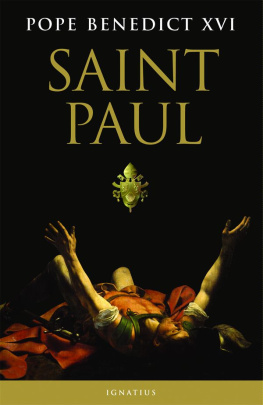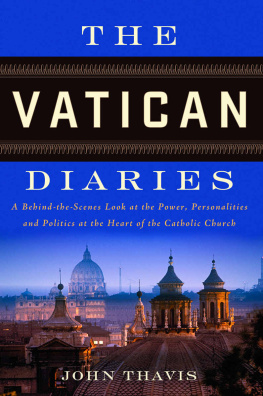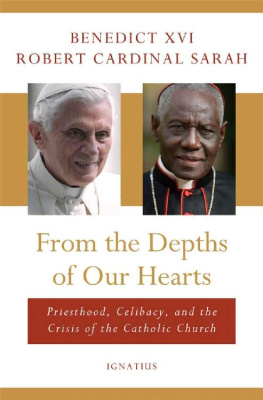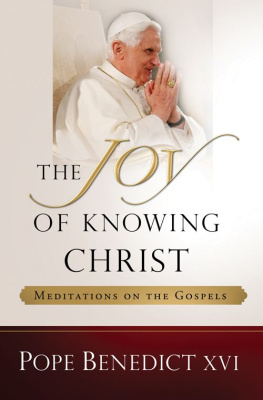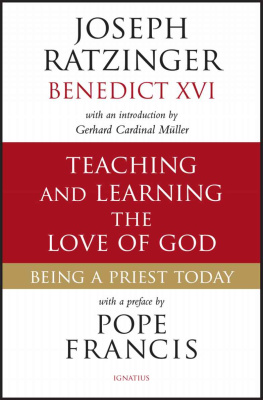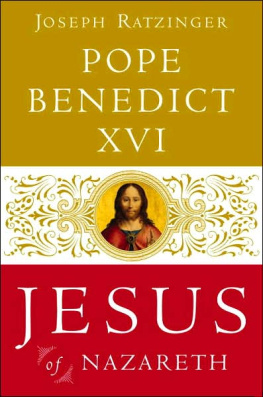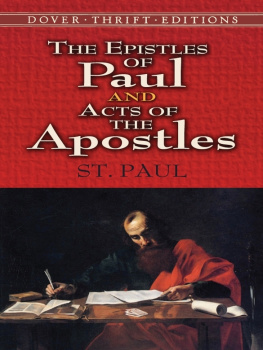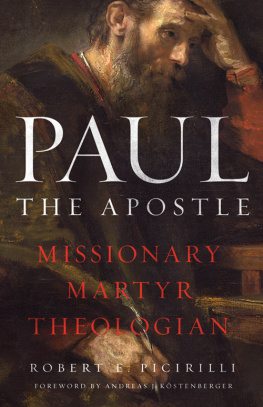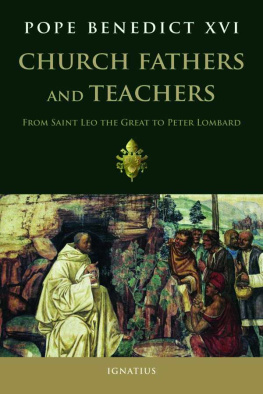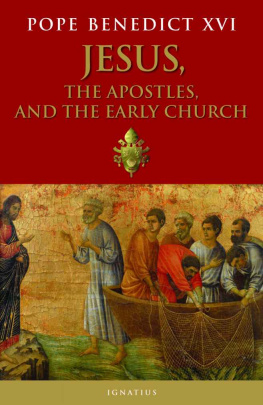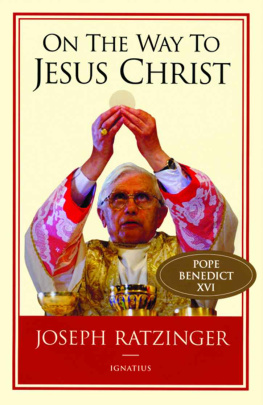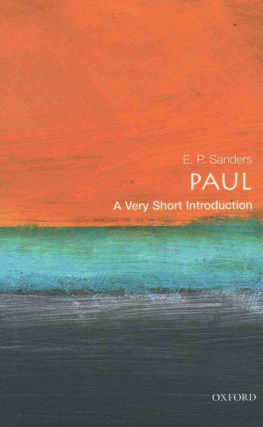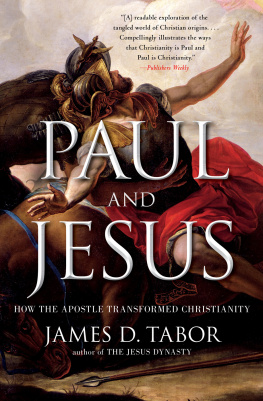Saint Paul
POPE BENEDICT XVI
Saint Paul
General Audiences
July 2, 2008-February 4, 2009
IGNATIUS PRESS SAN FRANCISCO
English translation by LOsservatore Romano
Front cover:
The Conversion of Saint Paul (detail)
by Caravaggio (Michelangelo Merisi da) (1573-1610)
S. Maria del Popolo, Rome, Italy
Scala / Art Resource, New York
Papal coat of arms image by www.AgnusImages.com
Cover design by Roxanne Mei Lum
2009 by Libreria Editrice Vaticana, Vatican City
All rights reservedISBN 978-1-58617-367-8
Library of Congress Control Number 2009923840
Printed in the United States of America
CONTENTS
1
Religious and Cultural Environment
Today I would like to begin a new cycle of Catecheses focusing on the great Apostle Saint Paul. As you know, this year is dedicated to him, from the liturgical Feast of Saints Peter and Paul on June 29, 2008, to the same Feast day in 2009. The Apostle Paul, an outstanding and almost inimitable yet stimulating figure, stands before us as an example of total dedication to the Lord and to his Church as well as of great openness to humanity and its cultures. It is right, therefore, that we reserve a special place for him not only in our veneration but also in our effort to understand what he has to say to us as well, Christians of today. In this first meeting let us pause to consider the environment in which Saint Paul lived and worked. A theme such as this would seem to bring us far from our time, given that we must identify with the world of two thousand years ago. Yet this is only apparently and, in any case, only partly true, for we can see that various aspects of todays social and cultural context are not very different from what they were then.
A primary and fundamental fact to bear in mind is the relationship between the milieu in which Paul was born and raised and the global context to which he later belonged. He came from a very precise and circumscribed culture, indisputably a minority, which is that of the People of Israel and its tradition. In the ancient world and especially in the Roman Empire, as scholars in the subject teach us, Jews must have accounted for about 10 percent of the total population; later, here in Rome, toward the middle of the first century, this percentage was even lower, amounting to 3 percent of the citys inhabitants at most. Their beliefs and way of life, as is still the case today, distinguished them clearly from the surrounding environment; and this could have two results: either derision, which could lead to intolerance, or admiration, which was expressed in various forms of sympathy, as in the case of the God-fearing or proselytes, pagans who became members of the synagogue and who shared the faith in the God of Israel. As concrete examples of this dual attitude we can mention, on the one hand, the cutting opinion of an orator such as Cicero, who despised their religion and even the city of Jerusalem (cf. Pro Flacco 66-69), and, on the other, the attitude of Neros wife, Poppea, who is remembered by Flavius Josephus as a sympathizer of the Jews (cf. Antichit giudaiche 20, 195, 252; Vita 16 ), not to mention that Julius Caesar had already officially recognized specific rights of the Jews which have been recorded by the above-mentioned Jewish historian, Flavius Josephus (cf. ibid ., 14, 200-216). It is certain that the number of Jews, as, moreover, is still the case today, was far greater outside the land of Israel, that is, in the Diaspora, than in the territory that others called Palestine.
It is not surprising, therefore, that Paul himself was the object of the dual contradictory assessment that I mentioned. One thing is certain: the particularism of the Judaic culture and religion easily found room in an institution as far-reaching as the Roman Empire. The position of those, Jew or Gentile, who would adhere with faith to the Person of Jesus of Nazareth was more difficult and troubled to the extent that they distinguished themselves from both Judaism and the prevalent paganism. In any case, two factors were in Pauls favor. The first was the Greek, or rather Hellenistic, culture which after Alexander the Great had become a common heritage, at least of the Eastern Mediterranean and of the Middle East, and had even absorbed many elements of peoples traditionally considered barbarian. One writer of the time says in this regard that Alexander ordered that all should consider the entire oecumene as their homeland... and that a distinction should no longer be made between Greek and barbarian (Plutarch, De Alexandri Magni fortuna aut virtute 6, 8). The second factor was the political and administrative structure of the Roman Empire, which guaranteed peace and stability from Britain as far as southern Egypt, unifying a territory of previously unheard-of dimensions. It was possible to move with sufficient freedom and safety in this space, making use, among other things, of an extraordinary network of roads and finding at every point of arrival basic cultural characteristics which, without affecting local values, nonetheless represented a common fabric of unification super partes , so that the Jewish philosopher Philo of Alexandria, a contemporary of Paul himself, praised the Emperor Augustus for composing in harmony all the savage peoples, making himself the guardian of peace ( Legatio ad Caium 146-147).
There is no doubt that the universalist vision characteristic of Saint Pauls personality, at least of the Christian Paul after the event on the road to Damascus, owes its basic impact to faith in Jesus Christ, since the figure of the Risen One was by this time situated beyond any particularistic narrowness. Indeed, for the Apostle there is neither Jew nor Greek, there is neither slave nor free, there is neither male nor female; for you are all one in Christ Jesus (Gal 3:28). Yet, even the historical and cultural situation of his time and milieu could not but have had an influence on his decisions and his work. Some have defined Paul as a man of three cultures, taking into account his Jewish background, his Greek tongue and his prerogative as a civis romanus [Roman citizen], as the name of Latin origin suggests. Particularly the Stoic philosophy dominant in Pauls time, which influenced Christianity, even if only marginally, should be recalled. Concerning this, we cannot gloss over certain names of Stoic philosophers, such as those of its founders, Zeno and Cleanthes, and then those closer to Paul in time, such as Seneca, Musonius and Epictetus: in them the loftiest values of humanity and wisdom are found, which were naturally to be absorbed by Christianity. As one student of the subject splendidly wrote, Stoicism... announced a new ideal, which imposed upon man obligations to his peers, but at the same time set him free from all physical and national ties and made of him a purely spiritual being (M. Pohlenz, La Stoa , I, Florence, 2, 1978, pp. 565f.). One thinks, for example, of the doctrine of the universe understood as a single great harmonious body and consequently of the doctrine of equality among all people without social distinctions, of the equivalence, at least in principle, of men and women, and then of the ideal of frugality, of the just measure and self-control to avoid all excesses. When Paul wrote to the Philippians, Whatever is true, whatever is honorable, whatever is just, whatever is pure, whatever is lovely, whatever is gracious, if there is any excellence, if there is anything worthy of praise, think about these things (Phil 4:8), he was only taking up a purely humanistic concept proper to that philosophical wisdom.
In Saint Pauls time a crisis of traditional religion was taking place, at least in its mythological and even civil aspects. After Lucretius had already ruled polemically a century earlier that religion has led to many misdeeds ( De rerum natura 1, 101 [On the nature of things]), a philosopher such as Seneca, going far beyond any external ritualism, taught that God is close to you, he is with you, he is within you ( Epistulae morales to Lucilius 41, 1). Similarly, when Paul addresses an audience of Epicurean philosophers and Stoics in the Areopagus of Athens, he literally says: God does not live in shrines made by man,... for in him we live and move and have our being (Acts 17:24, 28). In saying this he certainly re-echoes the Judaic faith in a God who cannot be represented in anthropomorphic terms and even places himself on a religious wavelength that his listeners knew well. We must also take into account the fact that many pagan cults dispensed with the official temples of the town and made use of private places that favored the initiation of their followers. It is therefore not surprising that Christian gatherings ( ekklesiai ), as Pauls Letters attest, also took place in private homes. At that time, moreover, there were not yet any public buildings. Therefore Christian assemblies must have appeared to Pauls contemporaries as a simple variation of their most intimate religious practice. Yet the differences between pagan cults and Christian worship are not negligible and regard the participants awareness of their identity as well as the participation in common of men and women, the celebration of the Lords Supper and the reading of the Scriptures.
Next page
